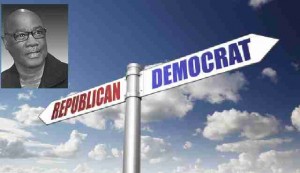By Carlton Joseph

The debates are over and the consensus is that Hillary Clinton won all three. The polls have her ahead of Donald Trump in the presidential race. We now have to wait for November 8, 2016 for the final result. So let’s now take a look at the candidates’ policy positions and the potential impact on the Caribbean.
Trump’s, like many politicians in the past, has exploited the anxieties, fears and resentments of the people who have been negatively impacted, financially, by the shift in the economy from an industrial to an education-based economy – white workers who lack college degrees. He has pledged to ban Muslims from entering the country and to build a wall on the US-Mexican border and have Mexico pay for it. His economic proposal is the failed Republican policy: Tax cuts for the rich and businesses and many, many jobs, because businesses will return and create the jobs. This tax policy gave us the 1929 great economic depression and the 2008 economic depression. Adopting it will give us the 2017 economic depression.
Since the debates did not bring much illumination to the policy positions of the candidates, and since I believe that Clinton will be the next president, let us examine the Democratic Party policy platform as it relates to Latin America and the Caribbean.
The Democratic platform embraces the Americas as a region of singular strategic, economic, and cultural importance and opportunity for the United States. Democrats reject Donald Trump’s proposal to build a wall and proposes to embrace Canada, Latin America and the Caribbean, and pursue strong, fruitful partnerships across the region. They propose to bolster democratic institutions, promote economic opportunity and prosperity, and tackle the rise of drugs, transnational crime, and corruption.
In Cuba, they propose to build on President Obama’s historic opening and end the travel ban and embargo, and stand by the Cuban people and support their ability to decide their own future and to enjoy the same human rights and freedoms that people everywhere deserve.
In Venezuela, they will push the government to respect human rights and respond to the will of its people.
In Haiti, they propose to support local and international efforts to bolster the country’s democratic institutions and economic development, and help more Haitians take advantage of Temporary Protected Status.
In general, they propose to strengthen the U.S.- Caribbean regional relationship through economic development and comprehensive immigration reform.
Democrats propose that global institutions, most prominently the United Nations and the World Trade Organization (WTO), and other multilateral organizations have a powerful role to play and are an important amplifier of American strength and influence.
But when the US talks about “bolstering economic institutions, promoting economic opportunity and prosperity, and tackling the rise of drugs, transnational crime, and corruption” it usually means adopting free trade policies that are not usually beneficial to us, and spending money on eradicating potential cash crops, like marijuana, and committing financial resources, that should be used to assist the local population in fighting crime and corruption. Everything the US does is in its own best interest. We must understand this and make decisions that are primarily in our best interest.
Of greatest concern should be the area of trade. I welcome the renegotiating of trade deals proposed by the Democratic Party platform. Caribbean governments have been entering into agreements with the WTO without fully understanding what they are getting into. In fact, I believe that we should hire Caribbean American and Caribbean Canadian based trade lawyers to assist in negotiating such deals.
For example, in March 2003, Antigua initiated the dispute resolution process of the WTO to challenge the United States’ prohibition on the cross-border supply of online gambling services.
This dispute between Antigua and the United States illustrates key issues in international trade, including the relationship between domestic legislation and international agreements, the potential for trade commitments to have unintended consequences and the challenges facing small countries in disputes with large ones.
The WTO empowered Antigua to suspend intellectual property rights held by U.S. firms. However, Antigua is not able to act on the decision because if it acts, it will negatively affect its agreement under The Caribbean Basin Economic Recovery Act, which gives Antigua preferential access to US markets but grants the US the right to alter the terms of the initiative unilaterally and without consequence, if Antigua disregards U.S. IP rights.
Antigua won in the WTO court but cannot collect. Clearly, it did not fully understand the consequences of all its contractual agreements.
Isaac Wohl states in the Journal of International Commerce and Economics that, “suspending IP rights is a thorny means of retaliation. If Antigua chooses to do so, it may set a precedent that provides small countries with useful leverage in trade disputes; but the difficulties of implementation and the harm done to Antigua’s reputation might overwhelm and outlast the economic benefits.”
This is the dilemma. Our exports are too small relative to our imports. The legal costs to protect our rights are exorbitant and the potential retaliation from the developed countries could destroy our economies. We must utilize our best legal minds to secure our economic future.
( Trinidad-born Carlton Joseph is a close observer of the United States political


